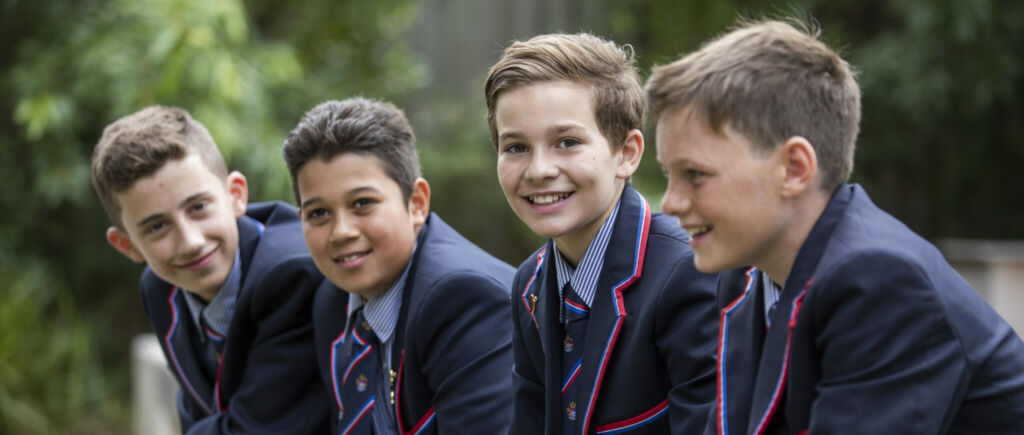Speak up, on topic!
Palm cards and tactics at the ready. Debating is a serious pursuit, writes Monique Butterworth.Huddled in groups, speaking enthusiastically in hushed tones – debating students are ambitious and determined. And while it might not be physical, make no mistake, debating is a competitive sport.
With most debating competitions allowing students just 45 minutes to prepare their case once a topic is declared, teams spend hours training each week to ensure arguments are on point. Sydney’s Monte Sant’ Angelo Mercy College debating coordinator Sarah Jackson says students learn very quickly that collective effort achieves success.
“Teamwork is really what underpins debating,” Jackson says. “Girls are put into teams. Often, they are working with girls they don’t know, so debating develops a sense of friendship, camaraderie and teamwork.
“Our girls train one to three hours each week. They compete in multiple competitions throughout the year and dedicate themselves as they would in any other sport.”
Last year, Monte Sant’ Angelo’s junior debating team took out the Independent Girls’ Schools Association (IGSA) Festival of Speech debating competition, which sees around 30 schools take part.
“That was a really big achievement,” Jackson adds. “Right now, there are a few competitions we’re competing in, including the ISDA [Independent Schools Debating Association], with many of our teams progressing through to the finals. It is competitive but it’s a healthy sense of competition.”
Degrees of Competitiveness
Monte Sant’ Angelo offers two streams for debating – social and competitive. “Social debating is for all students to take part in some capacity. We have around 200 students taking part, which is a significant percentage of the school.
“The competitive teams who take part in ISDA really enjoy the competition but what we value most is the girls building skills and having fun.”
Kirsten Dunsby, head of debating and public speaking at Melbourne’s Brighton Grammar School, says the training and practise required by students depends on the level of competition and a debater’s experience.
“In preparation for a competition, students will typically meet with their team twice in the lead-up for each debate to research, practise and refine arguments,” says Dunsby. “Our junior debaters meet every week to work with our coach and mentors to develop their debating skills.”
Brighton Grammar runs an interschool competition for their junior program and competes in the Brighton Division of the Debaters Association of Victoria (DAV).
“In addition to this, our students have presented at BaySpeak Rotary Competition and MUNA [Model United Nations Assembly], with our school’s representatives achieving honourable awards or notable mentions.
“There are many talented students who represent our school in debating, but we have an inclusive and supportive program that encourages students of all abilities to develop their skills and strive for success.”
Chris Taplin, debating and public speaking co-ordinator at Sydney’s Trinity Grammar School, says keen students actively undertake deep research in preparation for defined topic areas during peak debating seasons, where students participate in competitions on Friday evenings.
Trinity teams have regularly featured in finals, with teams from years 7, 8, 9 and 10 all on track to qualify this year. That success is rubbing off with the competition to represent Trinity Grammar growing.
“During my time, there has been a 30 percent increase in students wanting to participate in debating,” says Taplin. “It has surged to the point where it is difficult to keep up with demand.
“As with anything, the success rate for student participants has a direct input on an increase of interest. Aside from competitions, many parents see participation in debating as a valuable skill that will leave their child in a place where they feel confident in presenting in front of an audience and assist them with their school studies.”
Sydney Grammar School takes part in three competitions: the ISDA, GPS (Great Public Schools) and Eastside, which is held between schools in Sydney’s eastern suburbs.
Last year, the school fielded six teams, with four making it through to the knockout rounds. The year 10 and Senior A teams were ISDA competition winners.
Building Skills
Monte’s Jackson says debating builds confidence and encourages students to become more articulate.
“Students don’t decide which side of the argument they take, so debating forces them to step outside of what their own opinion may be and see things from another perspective.”
Brighton’s Dunsby agrees. “Debating encourages students to consider different points of view and to express their own clearly and persuasively. Debating teaches students important skills such as critical thinking, effective communication, research, time management, teamwork and leadership.”
Debating also encourages students to be more aware of global issues and consider points of view on complex issues. Trinity’s Taplin says debating encourages listening, too.
“The ability to think analytically about a broad range of social and political policies is needed more than ever as participants in a flourishing democracy,” he says.
“Debating also assists students in refining their communication, collaboration and critical thinking skills which are highly prized beyond the school gates in the world of work.”
The National Schools Debating Championship (NSDC), considered Australia’s most prestigious high school competition, takes place in Melbourne in May. A team from each state and territory competes in seven
preliminary rounds and three finals to be named national champions. Participants are eligible for selection in the Australian team which competes at the World Schools Debating Championships.
This piece by Monique Butterworth was published in ‘The Age’ on 29 April 2023
View the article tearsheet (PDF)

